
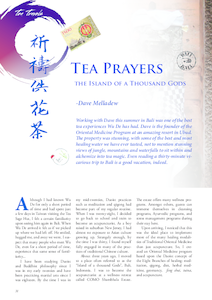 |
|
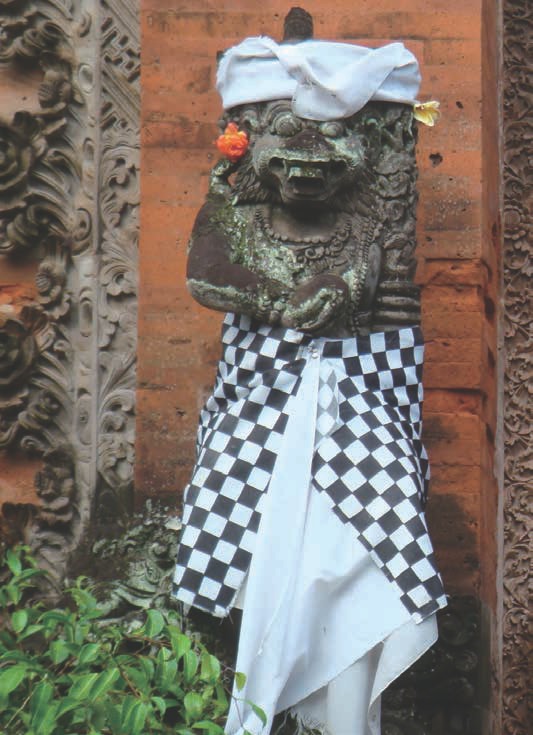
Although I had known Wu De for only a short period of time and had spent just a few days in Taiwan visiting the Tea Sage Hut, I felt a certain familiarity upon seeing him again in Bali. When Wu De arrived it felt as if we picked up where we had left off. He smiled, hugged me, and away we went. I suspect that many people who meet Wu De, even for a short period of time, experience that same sense of familiarity...
I have been studying Daoist and Buddhist philosophy since I was in my early twenties and have been practicing martial arts since I was eighteen. By the time I was in my mid-twenties, Daoist practices such as meditation and qigong had become part of my regular routine. When I was twenty-eight, I decided to go back to school and train to become an acupuncturist. As a boy raised in suburban New Jersey, I had almost no exposure to Asian culture growing up. Strangely enough, by the time I was thirty, I found myself fully engaged in many of the practices of traditional Chinese culture.
About three years ago, I moved to a place often referred to as the "Island of a thousand Gods", Bali, Indonesia. I was to become the acupuncturist at a wellness retreat called COMO Shambhala Estate. The estate offers many wellness programs. Amongst others, guests can immerse themselves in cleansing programs, Ayurvedic programs, and stress management programs during their stay here.
Upon arriving, I noticed that this was the ideal place to implement more of the many healing modalities of Traditional Oriental Medicine than just acupuncture. So, I created an Oriental Medicine program based upon the Daoist concept of the Eight Branches of healing: meditation, qigong, diet, herbal medicine, geomancy, feng shui, tuina, and acupuncture.
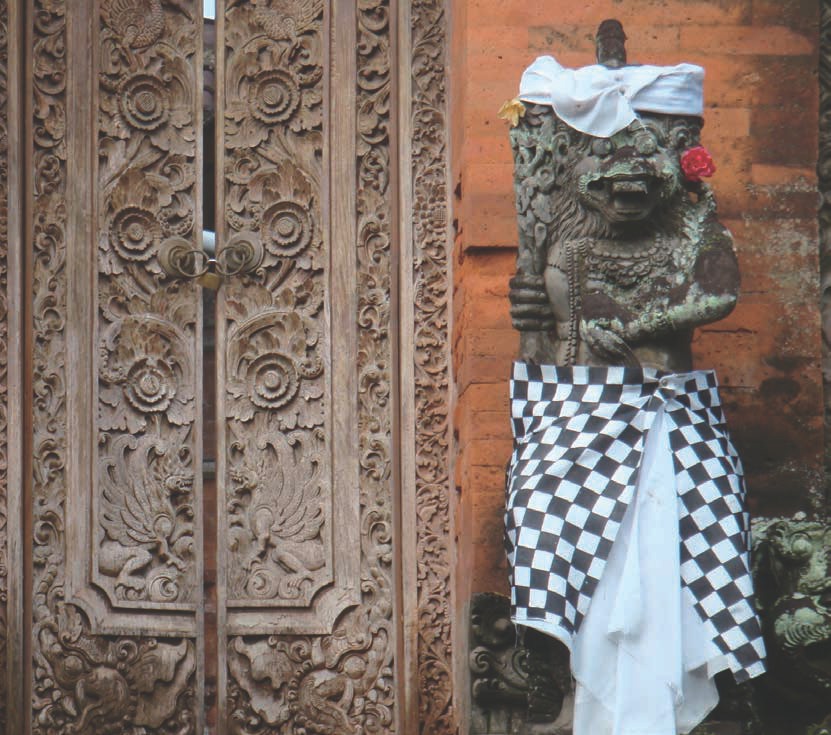
During my first semester of studying acupuncture in San Diego, California, I met Andrew Taylor. Andy and I would go on to be classmates, friends, and for several years, roommates. I consider Andy to be a close and personal friend and overall amazing human being. It was through Andy that I met Wu De.
I knew that Andy had been living in Taiwan for the past four years studying the language and furthering his studies in Oriental Medicine. He also told me that he had been volunteering at a tea center. I didn't really know what that meant, but I was very interested. I had some exposure to tea in San Diego through a friend. I immensely enjoyed sitting for tea and talking philosophy with other fellow tea drinkers. Although my experience was very limited, and my knowledge quite superficial, I did realize that it was something to explore further. I also knew that it could be a great compliment to what I do for a living. When I arrived at the Tea Sage Hut in Taiwan, it was obvious right away that this was tea drinking on another level. There at the Hut, tea was a meditation, it was a qigong, and above all it was a way of life, a Tao.
Upon arriving back in Bali after spending time at the center, I immediately started trying to figure out how I could get Wu De to bring his tea here to COMO Shambhala Estate. Interestingly enough, it was during a session of pouring tea for my manager that I convinced her to allow Wu De to come to the estate as a "Visiting Teacher". Thankfully Wu De was very open to the idea. He agreed to come this past July.
In Wu De's time here at the property he would conduct daily group tea sessions for guests, private gongfu sessions, and numerous other activities like gathering water and giving talks on health and longevity.
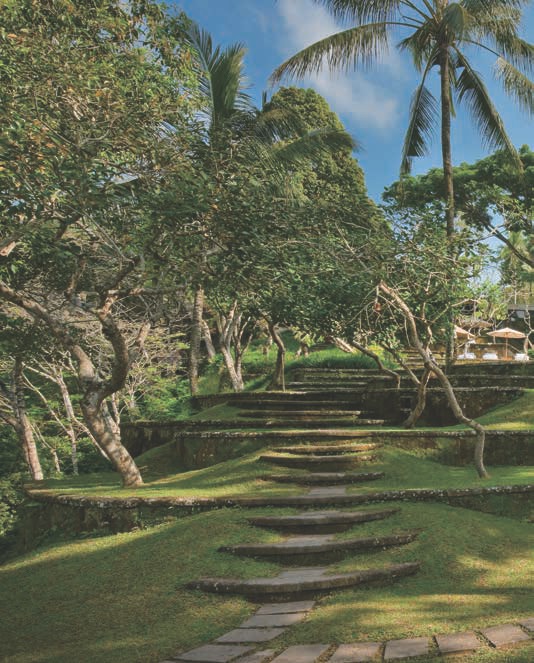
COMO Shambhala Estate is built on a beautiful sprawling piece of jungle in the Ayung river valley just north of Ubud, Bali. The property starts from the top of a hillside with beautiful views of the river valley, and stretches all the way down to the river itself. Some areas of the estate are perfectly manicured tropical gardens. Other areas are untouched lush jungle with wild monkeys and tropical birds. The property is dotted with waterfalls and pristine swimming pools that are all fed by natural spring water. It is full of places that are ideal to sit for tea sessions. The spring that feeds the property is one of the eight holy springs of Bali and is simply referred to as the "Source". The Source would be a focal point of Wu De's trip.
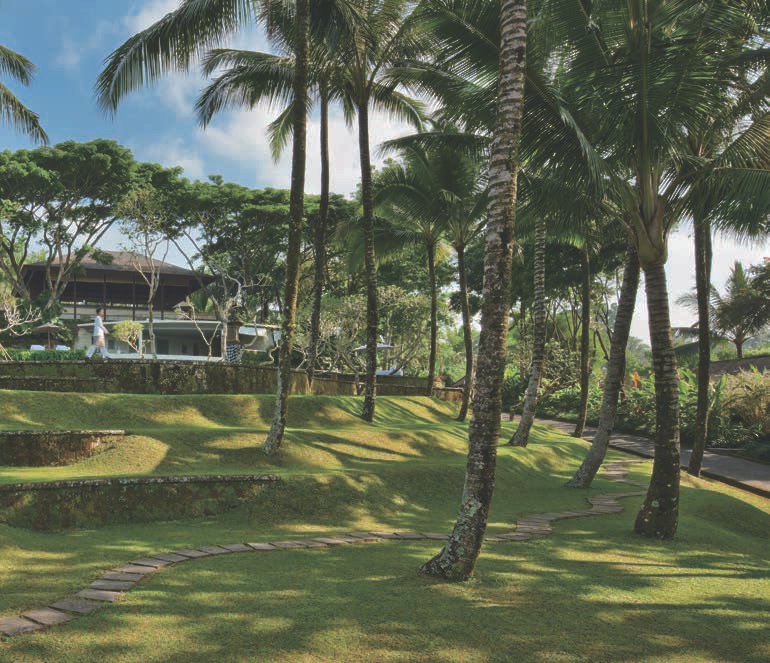
Every morning, Wu De, Andy, the guests and I would walk in silence to the Source located about halfway down to the river. The Source is a beautiful little spring that pops out of the jungle on the side of the valley. A small temple has been built up around it to allow locals to gather the water and perform ceremonies.
Upon arriving at the Source, offerings of local flowers, usually frangipanis, were made at the temple. We would then proceed to collect the water from the spring. Wu De would conduct a small prayer of gratitude and blessing for the water. From there, we would climb back up to the top of the hillside to the estate's main temple. At the main temple, the local mangku, or village priest, would come to perform a daily cleansing ceremony to bless the water and us. This blessed water would then be used in that day's tea ceremony.
Once during Wu De's stay, Wu De and the guests went to the holiest spring in Bali, Tirta Empul. Tirta Empul literally means "the place where holy water erupts from the ground". It is a nine-hundredyear-old temple that sits on a beautiful natural spring. There are several wading pools fed by the spring water. In the wading pools, there are beautiful fountains made of stone that feed into the pools. Each beneath its waters. One fountain is said to cleanse your dreams, one your past karma, one your skin, and so on. There are about fifteen different fountains.
After performing a small offering and ceremony at the entrance temple, the guests submerged themselves into the wading pools of Tirta Empul. A cleansing ritual was performed at each fountain. For nine hundred years, the Balinese have lined up day after day at each of these fountains. They have prayed to the same gods, performed the same rituals, and concentrated on cleansing each of these aspects of their being. Tirta Empul is one of the most powerful places in Bali.
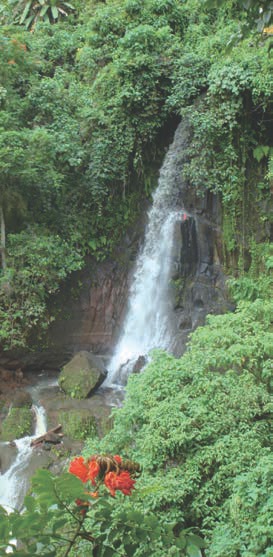
After the cleansing, water was gathered. Another ceremony was conducted in the main temple by the high priest of Tirta Empul in order to bless the water. Due to the fact that Tirta Empul is such a significant spiritual spot for the Balinese, the high priest of the temple is held in high regard. The water he blesses is considered to be very special. The guests then returned to the estate and used that water for that day's tea session.
One of the most interesting things to observe during Wu De's visit was the guest's reaction to tea. The guests staying here did not come to the estate for tea. Most weren't even aware that Wu De was here until they arrived. Much of what we did in the time that Wu De stayed with us was to engage the guests and try to inspire them to sit with us for tea. The beautiful thing was when they did, they absolutely loved it. Most of the guests had never experienced any type of tea ceremony. They knew very little about it. They did not realize that tea was a "thing", a practice or a way of life. However, when they did come, they became fully engrossed. Some of them struggled to sit still and be silent. However, after drinking a few bowls of tea, most guests settled in and began to relax. Many guests ended up coming to multiple tea sessions and some even expressed interest in visiting the center in Taiwan.
It was beautiful to see people be introduced to the depth of Tea and Her lessons. It was also beautiful to see Wu De convey that message through, of course, the tea itself, but also through his words of wisdom born out of drinking tea as a way of life these years. They all left seeing Tea in a completely new light.
Another amazing aspect of Wu De's visit was his impact on the staff. All of my fellow staff members that attended Wu De's tea sessions have become Chajin. Several of them have also become members of Global Tea Hut, as well as regular drinkers of tea both at home and work. They also realized how complimentary a life of tea could be to the very essence of what we teach and practice at the estate.
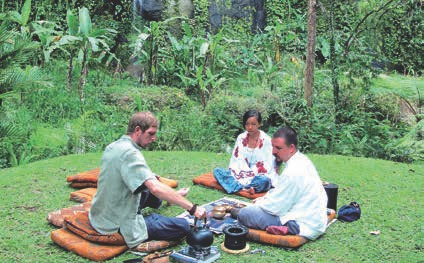
One of the beauties of this property is the variation of landscape and terrain. Each area of the estate imbues a different feeling. A great aspect of Wu De's time here was the full use of each area for tea drinking. We sat for tea all over the estate, with each location offering a unique experience to that session. Some areas were more favorable than others. It was interesting to note the differences and how they matched my own experiences when doing qigong and meditation in those areas. Some of Wu De's favorite spots to sit for tea, unbeknownst to him ahead of time, turned out to be my favorite spots for practicing qigong; showing me once again, that tea ceremony and qigong are really one and the same. But my absolute favorite moments came at the end of the day or early in the morning when there were no guests. We could then sneak off to different secluded spots to drink tea. There was one evening where we drank some very special aged puerh tea in a small outdoor pavilion during the soft fading light at the end of the day. It was just Wu De, Andy, and I drinking tea and laughing. It was a true highlight of the trip for me.
We arranged to schedule Wu De's last day here at COMO Shambhala Estate to be on the full moon. Full moons in Bali are very significant. They are celebrated every month with copious ceremonies, music, and offerings. This one, however, was a blue moon, the second full moon of the month, and the energy of the locals on the island was particulary high.
Wu De performed this last tea ceremony beneath the sky on a beautiful open space of grass. We laid out an amazing old piece of wood on which Wu De had become fond of serving tea on. We surrounded it with cushions and candles. It was the perfect little set-up to enjoy some amazing tea beneath the gloriously large blue moon. Although that evening the sky was a bit cloudy, there was a moment about eight bowls into our session when the full moon broke out from behind the clouds and shone brightly down on us. The sight of this beautiful scene evoked an audible gasp from the guests. This was a magnificent culmination of two weeks of drinking beautiful tea in Bali, with friends both new and old.
One of the main things that became crystal clear during Wu De's visit is that tea is truly medicine. Not only is it medicine, it is the epitome of traditional Oriental Medicine.
Every aspect of sitting for tea embraced the essential elements of what I try to cultivate in my own practice and everything I try to teach guests here at the estate.
Tea cultivates stillness of the mind, awareness of the internal world, the body, the breath, and our Qi. It also sharpens the senses and increases awareness of the external world and the environment around us. It helps us appreciate the healing effects of clean water and the calming impact of Nature.
Tea requires sensitivity and practice of harmoniously blending the five elements of traditional Oriental Medicine: water, fire, earth, metal, and wood. It is through balancing these elements that it helps us maintain both our internal and external equilibrium. When we use this harmonious blend of elements to create the perfect bowl of tea and then ingest that tea, how could that not heal us?
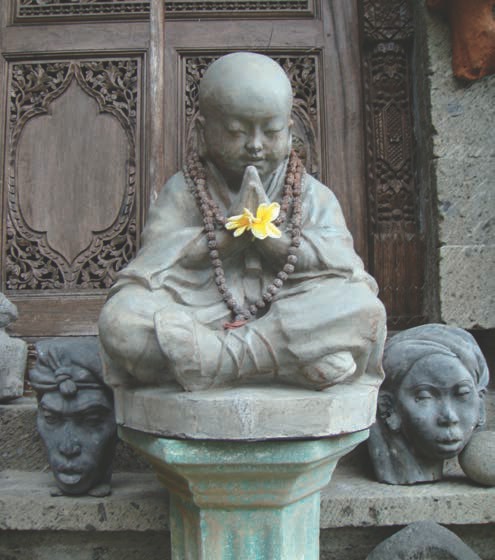
I am extremely grateful that Wu De, Joyce and Andy were able to come here to Bali. I am also thankful for the two weeks I got to drink tea in one of the most beautiful places in the world with people I consider to be part of my family.
I realize that the sense of familiarity that I have with Wu De is born of the fact that we've shared tea together. Although it had been only a few times prior to him coming to Bali, it did not matter. When you ingest the love that Wu De puts into every bowl of tea, it is inevitable that you will feel this connection to him. Then, I think of all of the hundreds and hundreds of people to which Wu De has served tea. I realized that they too must also feel that same sense of familiarity.
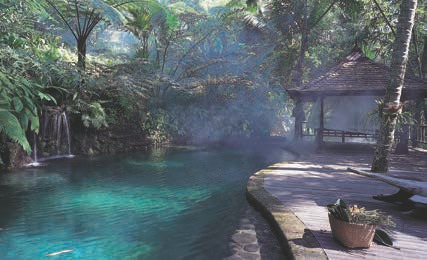
After Wu De left the island, there were certain residual feelings left behind. There was a feeling that my practice here had become deeper. There was a feeling that Tea was now a permanent element of what I do here at COMO Shambhala Estate. When Wu De left, there was a sense that the Island of a thousand Gods was no longer the same - somehow full of tea magic, as if the thousand gods were all drinking happily now...
